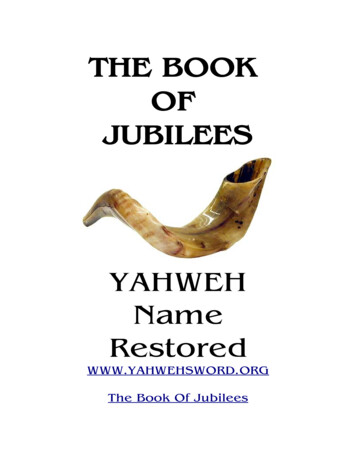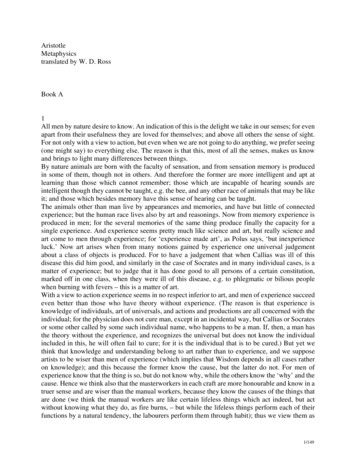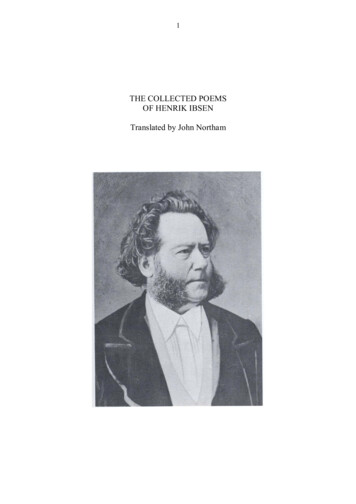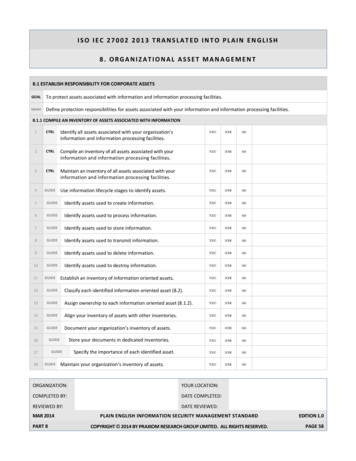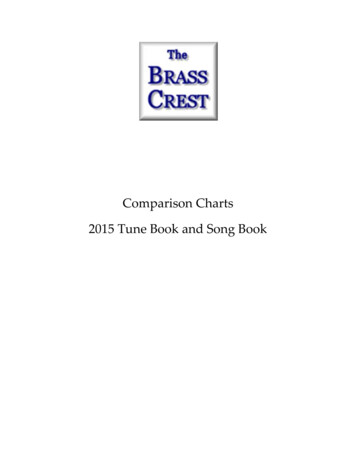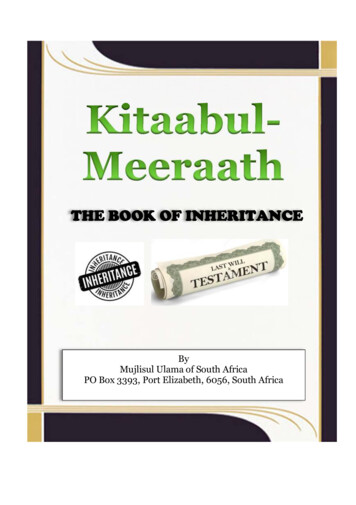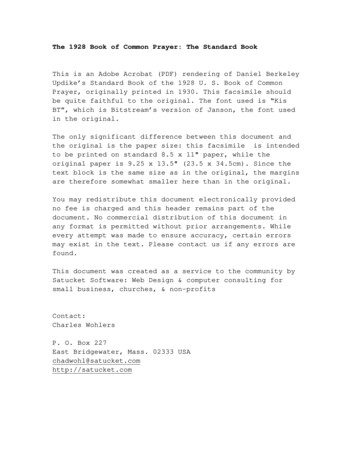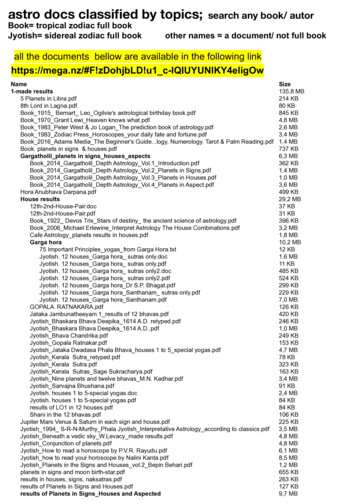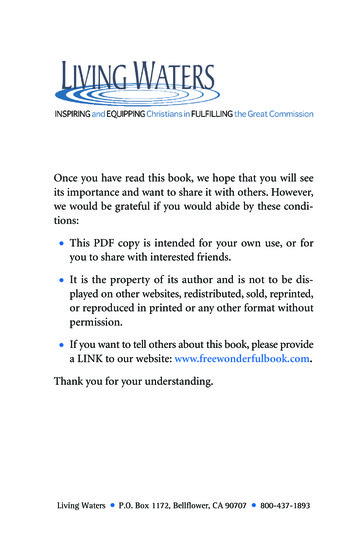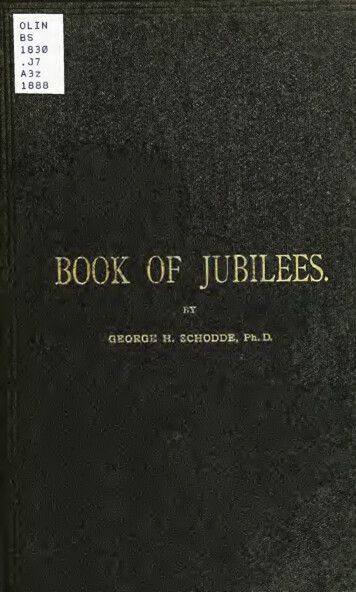
Transcription
' Moses commandedus a Torab;Even the inheritance of the congregation of Jacob.'EX LIBRIS
.'rvSTa9W;S
Cornell UniversityLibraryTheoriginal oftiiisbookis inthe Cornell University Library.There are no known copyrightrestrictions inthe United States on the use of 45669
The Book of JubileesTRANSLATED FROM THE TAL UNIVERSITY, COLUMBUS, OHIOOBERLIN, OHIO:E. J.GOODRICH1888
INTRODUCTORY NOTES.One ofinthe most marked features of theological researchour day and decade is the intense interest which char-acterizes theandworkinbiblicaltheology, technically sodepartment no auxiliary branch hasbeen more productive of good results than has been thatdiscipline called History of New Testament Times, or thestudy of the times of Christ as to their religious, moral,and social features. The aim of such study is to reprocalled,in thisduce, as far as possible, the exact picture of Christ'searthly career in the midst of all the agencies which influ-enced him and upon which he exerted his influence inother words, to understand Christ's words and works withtheir true historical background and surroundings.It isa line of investigation that has produced, indirectly, suchmasterpieces as Weber's System der altsynagogalen paldstinischcn TJieologie (Leipzig, 1880), and, directly, such asEdersheim's Life and Times of Jesus the Messiah, as alsothe two Neu- Tcstamentliche Zeitgeschichten, of Schiirer andHausrath, as well as many other works, smaller in dimensions and more closely circumscribed in scope, while thespirit and method of this research is felt in every fibre ofthe leading exegetical and historical works on biblicalsubjects.The object of all this study is to produce anaccurate and truly historical picture of Christ and Chris;tianity.In the pursuit of this aim the Book of Jubilees has anot unimportant mission. This importance lies in the factthatit, ifliescarefully studied, will furnish valuable contribu-toward the understanding of that problem whichback and behind all the work and teachings of bothtions
INTRODUCTORY NOTES.XChrist and his disciples, as also of the writings of thelat-namely, the doctrines, beliefs, and spirit of New Testament Judaism. Christ came unto his own, and his ownreceived him not (John i. 1 1), because Israel had departedter,from the revelations of God. Instead of a justification byfaith, as is taught throughout the whole Old Testament,the cotemporaries of our Lord taught a justification by thelaw, a legal righteousness. The central principle of Jewish orthodoxy was the nomistic principle, that obedienceto the law in all its real and imagined ramifications mustbe the basis of acceptance before God. Thus there wasan impassable gulf fixed between the theological systemof the Jews and that of Christ and his disciples.Thelatter was a further development from Old Testamentpremises; the former was a radical departure from allpre-Christian revelation. This woful heterodox)-, whichconstituted the backbone and marrow of the acceptedtheology of the day, meets Christ and his discipleswherever they work or speak, and has been an all-powerful factor in moulding the shape and form which the NewTestament revelation and development has assumed. Weneed in this connection to cite as examples only the Pauline doctrine of the law, in which he antagonizes, not thelaw as such, but only the false stand-point of the Jews inregard to the law, and his outspoken and decided championship of the doctrine of justification by faith aloneover against a justification by works, suggested, beyondall doubt, by the fundamental error of the Jewish systemof his day.In the study of these problems theitsmission.Thebook before useditor of the Ethiopic text andfindsGermanproved to the satisfacbook is a productionof the first Christian century.In Ewald's Jahrbucher derbiblischen Wissenschaft for 1850 and 1851, he has publisheda German translation of the book from a single anddefective manuscript, and added a short discussion of thetranslator. Professor Dillmann, hastion of scholars in general, that the
INTRODUCTORY NOTES.XIcontents.There (pp. 90-4) he shows that the book presupposes and cites those parts of the Book of Enoch whichdate up to about the birth of Christ, while it, in turn, hasbeen used and quoted by the Testament of the TwelvePatriarchs, a work similar in spirit and a product of theearly part of the second century. This will decide theend of the first century after Christ as the date for thecomposition of the Book of Jubilees. By Christian authors the work is not quoted until later. Epiphanius,Jerome, and Rufinus are the first to mention it, whileSyncellus, Cedrinus, and other Byzantine writers quotefromitTheseat length.citations are collected in Fabri-Codex Pseudepigraphus Veteris Testamenti, 1722, vol. i.But the testimony of the Testamentuni XII.849-64.pp.cius,Patriarchariimdecisive as to the terminusisadquern.Ronsch, who has made a most exhaustive study of thebook, confidently claims that it was written before thedestruction of the temple, pointing to the words in c. i,23 49, 27, and similar passages, which could not havebeen written after that event. Cf. also Drummond, TheJewish Messiah, p. 146, and Schiirer, 1. c. 463.As the book is undoubtedly the work of a PalestinianJew and written in Hebrew (although the Ethiopic istranslated from the Greekcf. Dillmann, 1. c. p. 88 ff.), itcan be fairly considered as an outgrowth of that schooland spirit of Judaism which we in the New Testamentfind arrayed in opposition to Christianity and its work.The book can best be described by calling it a haggadiccommentary on certain portions of Genesis and the;—opening chapters of Exodus, and it is thus the oldest ofthe Midrashim, and a representative example of themanner in which the learned contemporaries of Christmade use of the biblical books for their own peculiar purpose and object. It is a sample of an exegetical Targumof those days in the spirit of New Testament Judaism.Just to what particular school of Jewish thought it owesallitsoriginwould bedifficult to decide.Since the publica-
INTRODUCTORY NOTES.XUGerman translation, a number of Jewish scholsuch as Jellenek {Beth-ha-Midrash, 1855, p. x. ff.), Beer{Das Buck der Jubilaen, 1856), Frankel {Monatsschrift furGescliichte u. Wissenschaft desjudenthums, 1856), and earlier,Treuenfels (Literaturblatt des Orients, p. 1846), have discussed the problem, one advocating a Samaritan origin,another an Essene, another claiming that it arose in theEgyptian Diaspora, but all agreeing as to its thoroughlyJewish origin and, in general, its representative character,while Ronsch even thinks that he detects an anti-Christiantendency {Das Buck der Jubilaen, oder die kleine Ge iesis,tion of thears,pp. 518-20).What time and source would indicate is amply verifiedby an examination of the contents. This, of course, cannot be the place, nor is it our object, to analyze criticallythe contents of the book, but by pointing to- a few prominent featuresitwillbe readily seenhow thoroughlythebook harmonizes with the leading thoughts of Jewishorthodoxy in Christ's day. The centre of that orthodoxywas the law and its paraphernalia, and all means, lawfuland unlawful, were put into requisition to exalt the importance of that law and to increase its authority. Theeternity and pre-existence of this law, its festivals and itsceremonies, are accepted beliefs of later Judaism (cf.Weber, 1. c. § 4 ff.). To the service of this dogma thewriter of the Book of Jubilees has lent his pen. Heagain and again maintains the thesis that the law existedfrom eternity, although revealed in full only throughMoses; that even in heaven, before the creation, theangels observed the festivals, services, and ceremonies ofthis law; that throughout their lives the patriarchs allstrictly carried out its behests.All these things werewritten on the "tablets of heaven," and were graduallyintroduced among the pious fathers as occasion offered anopportunity, and the teachings concerning them werelaid down in writing at the very beginning, which booksofmystery were handed down from fatherto son in theo-
INTRODUCTORY NOTES.cratic succession.Thiswhole work, and,some form orisxiiithe leading thought of theother, is found in nearlyremarkable example of how willingthe Jews in Christ's day were to employ a most remarkable exegesis in order to make the records of revelationaccord with their false view of its legal features.Besides this leading characteristic of the work, there aremany others of less importance that are interesting andinstructive, and that cast a discerning light on the Jewishworld of thought at the New Testament era. Outwardlythe leading feature is the chronological system of thebook, namely, its division of all ancient history of theIsraelites according to the sacred periods of jubilees offorty-nine years, which fact gives it one of its Greeknames, TaT&)/S' ;Xata(Epiphanius,« i'.// r., i, 3,6), the otherbeing r] Xe-Trrr) yiveai';, XeiTTD'yevecri';, or fjLi,Kpo yeveaL ;, so called,not because it is shorter than the canonical Genesis, but because it had less authority. The time between the creation and the entrance of Israel into Canaan is counted asfifty jubilees, or 2,450 years, which in general agrees withevery chapter.inIt is athe biblical records.In the details of this chronologicalarrangement there are occasionally slight variations fromthe Hebrew text, and in these instances there is often asurprising agreement with the Septuagint and the Samaritan versions.Dillmann is probably correct (p. yy) inascribing these variations from the Hebrew, not to theauthor, but to the translator, accommodating the numbersto the Septuagint text recognizedIt ishowremarkableamongthe Greeks.the writer bridges overdifficulties of the canonical Genesis.The speakingalltheof theserpent in Paradise is explained by the fact that before theanimals could speak he knows the names of all thewives of the patriarchs, also the day and month whentheir children were born; he shows how Genesis ii. 17was literally fulfilled, since before the Lord a thousandyears are as one day, and Adam died before he was athousand years old a parallel exegesis to this is found infall all;;
INTRODUCTORY NOTES.XIVJustinMartyrTryphonec.Noah broughtassistanceHe8i.narrates withwhosethe animals into the ark;howthe Hamitic tribes of Palestine unlawfully took possessionShem's portion that Rebecca loved Jacob more thanEsau because Abraham had told her that the youngerson would be the theocratic successor; also why it wasof;thatAmnonrefused to takelicalTamarto wife;how Mosesand many other bibnarratives are explained and complemented in variouswas preservedin the bulrushes, etc.,manners, usuallyThe bookinan apologeticalspirit.and fables concerningthe fathers in Israel, some of these being found also in theTestament of the Twelve Patriarchs, and other earlierand later works, but many not preserved elsewhere. Inthis connection we mention the names of the wives of thepatriarchs and of the sons of Jacob the name of the landto which Adam was driven after the expulsion from Edenisalso full of stories;thenumberof the sons ofAdamname;the four sacredmoun-mountain of the Ararat chain where the ark rested the extensive account ofthe fall of the angels in the days of Jared, together withthe dire consequences of their sins with the daughters ofmen, which story forms the burden of the earliest portions of the bookthe story of the books of Enoch,Noah, Abraham, Isaac, and others; the early days ofAbraham, is piety, and fight against the idolatry of hisfather's house; the ten temptations of Abraham, andmany similar stories concerning Jacob and his relations toEsau, and concerning the sons of Jacob and their history.The angelology and demonology of the book are carriedout quite cyieasively, and in the main thoughts agreetains of the earththe;of the;;1with the ideas [.)und in other apocalyptic works. Theall models of virtue, and especially prominent through their observance of the Levitical ordinancesand ceremonies. The rest of the work is in harmony withpatriarchs areBoth through what it states and whatwork is instructive in teaching what was theamong the Jews in those memorable days.these statements.itomits, theZeitgeist
INTRODUCTORY NOTES.But, of course, thefullcontribution of theXVBookofNewTestament can only be securedthrough a careful and patient study of every chapter andJubileestotheIn order to enable scholars who are not acquaintedwith the Ethiopic to do this work, the present translationis here offered.It has been made directly from the bestEthiopic text accessible, and with the best aids at the translator's command.As has been stated above, the Germantranslation by Dillmann is from a single defective andpoor manuscript. Nine years after its publication, in 1859,Dillmann, the prince of Ethiopic scholars in our century,issued a critical edition of the Ethiopic text on the basisof two manuscripts, entitled. Liber Jiibilaeoriim Qui idem aGraccis' A. Xsttt 'yeveai'; inscribititr, vcrsione Graeca dcpcrdita,nunc nonnisi in Gcez lingua conservatus, nupcr ex Abyssiniaverse.inEuropamallatus, Aethiopiceadduoriini librorum inainu-August Dillmann. Hehad hoped himself to make a new translation of the bookfrom this improved text (cf. Praefatio p. x.), but has neverbeen able to do so. In Rbnsch's edition, however, of aLatin fragment of the book found in 1861 by Ceriani, andembracing about one-third of the book, he has given aLatin translation from the Ethiopic of those sections corresponding to the Ceriani fragment. The need of a newtranslation has frequently been urged (cf., e.g., Drummond,As there is no such version in any modern1. c, p. 144).language, the present translator has attempted to do this,leaving to others to investigate the book in its- whole,length, depth, and breadth. In order to facilitate the studyof the book, the translator has not only adopted the division of Dillmann into chapters, but has also divided thesescriptoruvi fidcm prinium cdidit Dr.again into verses. The lack of this latter feature in Dillmann makes the use of his version very difficult. Thefullest discussion of the book is that of Ronsch, besideswhose work those mentioned in this introductor}- notemay be consulted. The English reader will find valuableaid in Drummiond, pp. 143-147.
THE BOOK OFJUBILEES.These are the words of the division'of days,accordingto the law and testimony," according to the events of theyears, according to their sevens, according to their Jubilees, to allof thewordwhen he ascendedstone tablets of the law and the commandvoice of the Lord when he said to himthe years of the world, according to theLord on Mount Sinaito receive thements by the"Ascend to the topof theto Moses,mountain"'!Chap. L And it happened in the first year of the exodus of the children of Israel out of Egypt, in the 3rd month,on the i6th of this tnonth, and the Lord spoke to Mosessaying: "Ascend to me here on the mountain, and I willgive to thee the two stone tablets of the law and thecommandments; as I have written them, thou shalt makethem known." 2. And Moses ascended the mountain ofthe Lord, and the glory of the Lord dwelt on the mountain of Sinai, and a cloud overshadowed it six days.3.And the Lord called to Moses on the seventh day in the'Kufale,whichthisi.e.,book"Bookdivision, or rather,isknown amongof Division,"the Abyssinians.Inin the Apostolic Canons, 55.books of the KiifalS." The nameAs suchFell's edition, c. 56,isistlieit iswe readname bycited, c. g.,of "threederived from the fact that the authordivides the history he records according to the chronological system ofjubilee periods.' Both words used in theemployed for "covenant,"covenant relation between original for law6ia f/KTi.IsraelThe twoand testimony are frequentlytogether evidently express theand Jehovah.In claiming divine and Sinaitic authority for the production before us,more than what is claimed for the whole of the oralthe author does nothingCf. especially the opening sentences of the PirkeMishna. The apocalypses of the same period also claim inSuch z.pia fraus was manifestlyspiration, prominently the book of Enoch.not considered a moral wrong.traditions of the Jews.Abothin the
THE BOOK OF JUBILEES.2midst of the cloud and he saw the glory of the Lordlike a flaming fire on the top of the mountam/4. AndMoses was there on the mountain forty days and fortynights, and the Lord instructed him in regard to whatwas past and what would be, the words of the division ofdays, both in the law and the testimony.5. And he said tohim: "Incline thy heart to every word which I shallspeak to thee, and write them into a book, in order thattheir generations may see how I have left them on accountof all the evil which they do, in rebelling and in desertingthe covenant which I established between me and theethis day on Mount Sinai for their generations.6. And itwill be and these words shall declare it thus when all thepunishments shall come over them, and they will knowthat I am more righteous than they in all their judgmentsand their desires, and they will know that I was withthem. 7. And thou, write for thyself all these words;make knownto thee this day (for I know theirand their stiff neck ) before I shall lead theminto the land which I have sworn to their fathers, toAbraham and to Isaac and to Jacob, saying, "To yourseed I will give this land, which flows with milk andhoney and they shall eat and be satisfied. 8. And theywhichIrebellion';themselves to false gods, who did not dfeliverall their oppression and this testimony will beheard against them for a testimony. 9. For they willforget all my ordinances which I have commanded them,and will vv alk after the Gentiles and after their impurityand after their shame, and will serve their gods, and thesewill become for them an offence unto oppression and misfortune and for a trap. 10. And many virill be destroyed and willbe taken captive and will fall into the hands of the enemy,because they have deserted my ordinances and my comwill turnthem fromEx. xxiv. 15-17.'Cf.-Deut. xxxi.the book, thereof the;bookof27.isHere, and indeed throughout the opening chapters ofa marked similarity between the author's ideas and thatDeuteronomy.
THE BOOK OF JUBILEES.mands and3covenant, and my sabbathshave sanctified to myself in their midst,the festivals ofmyand that which Iand my tabernacle andmy sanctuary which I have sanctimyself in the midst of the land that I should setmy name over it and it should dwell there, ii. And theywill make to themselves altars on heights and groves andsculptured idols, and each one will worship his own idolfor sin, and they will offer their children to the demonsand to all the deeds of the error of their hearts. 12. AndI will send witnesses to them that I may testify overthem, but they will not hear and will slay my witnesses,and they will cast out those who seek the law, and willabolish the whole [law], and will begin to do evil beforemy eyes. 13. And I will hide my face from them and Iwill deliver them over to the gentiles for captivity and forbinding and for devouring and for expelling them fromfied tomidst of the land, and I shall scatter them in themidst of the gentiles. 14. And they will forget all mylaw and all my commandments and all my judgment,and they will err in reference to new moons and sab15. Andbaths and festivals and jubilees and ordinances.then they will turn themselves to me from the midstof the gentiles with all their hearts and all their souland all their power, and I shall gather them fromamongst all the gentiles, and they will seek me thatI may be found for them when they seek, me with all theirheart and with all their soul, and I will open to themthemuch peace andthemrighteousness.16.Andas a plant of righteousness, withIallwill transplantmyheart andandwith all my soul, and they will be to mebuildupnot for a curse, a head and not a tail and I willmy sanctuary in their midst, and 1 will dwell with them,and I will be to them their God, and they shall be to memy people, in truth and in righteousness, and I will notdesert them and will not deny them, for I am the Lordfor a blessing;God." 17. And Moses fell down upon his face, andhe prayed and said " My Lord and my God, do not for-their:
THE BOOK OF JUBILEES.4sake thy peoplp and thy inheritance to wander in theerror of their hearts, and do not deliver them into thehands of their enemies, the gentiles, that these may notrule over them, and that they do not make them to sinagainst thee.i8. O Lord, let thy mercy be raised overthy people, and create for them a righteous mind, and letnot the spirit of Beliar rule over them to accuse them'before thee, to entrapthem away from the pathof right-eousness, that they be destroyed from before thy face.19.But they are thy people and thy inheritance, which thou hastdelivered from the hands of the Egyptians with thy greatpower; and create in them a clean heart and a holy spirit,and let them not be entrapped in their sins from now onand to eternity " 20. And the Lord said to Moses: "Iknow their contrariness and their thoughts and their stiffneck, and they will not obey until they learn their sinsand the sins of their fathers. And after this they willturn to me in all righteousness and with their whole heartand with their whole soul, and I will circumcise the foreskin of their hearts and the foreskin of the hearts of theirseed, and I will create for them a holy spirit, and will cleansethem so that they do not turn away from me from this dayto eternity.21. And their souls will cling to me and toall my commandments, and my commandments shall return to them, and I will be to them a father, and they shall!be to me children. And they shall all be called the children of the living God, and will know all things of thespirit and all things of service, and it will be known thatthey are my children and that I am their father in righteousness and in truth, and that I love them. 22. Andthou, write down for thyself all these words which I havethis day make known to thee on this mountain, the firstand the last and what is future, according to all the division of days in the law and in the testimony, and according'Beliar, (ieXiap,cf.2 Cor.vi. 15,anameapocalyptic and early ecclesiastical literature.of Satan frequentlyfoundin
THE BOOK OF JUBILEES.weeks of the jubilees to eternity,and dwell with them in all eternity."to the'5untilIdescendAndhe said to the angel of the face;' "Write forof creation until my sanctuaryshall have been established in their midst for all eternity,and the Lord will have appeared to the eyes of all, andall will know that I am the God of Israel and the Father ofall of the children of Jacob and King on Mount Zion frometernity to eternity. And Zion and Jerusalem will be23.Moses from the beginningholy."And24.who wentthe angel of the face,before thetents of Israel, took the tablets of the division of yearsfrom the time of the creation, the law and the testimonyfor the weeks and the jubilees, each year according to allits numbers and the jubilees according to years from theday of the new creation, when heaven and earth werecreated new, and also all creation according to the poweisof heaven and all the creation of the earth, until then whenthe sanctuary of the Lord will be made in Jerusalem onMount Zion, and all the luminaries will be renewed for ahealing and for peace and for a blessing for all the chosenof Israel, that it may be thus from this day on and to allthe days of the worldChap. II. And the angel of the face spoke to Moses bythe command of the Lord, saying " Write all the words:'The word " weeksyears,i.Thee.," isused throughout the work in the sense of week offorty-nine years, or one jubilee period.1XPD, the favorite angels of apocalyptic writers,God and man. Later writersresort to this means of communication between divinity and humanity allthe more in order to preserve the former from all contact with the latter,and thus preserve the holiness of God. The idea is born from the samespirit that induced the Septuagint translators to smooth over the anthropomorphism and antjiropopathies of the Hebrew text, and helped much to thedevelopment of Philo's logos idea and allegorical method of interpretation,as also to the popularity of the Menire mediatorship in Grd's dealings withmen and the world so generally prevalent in the Targumim. Of. Zech. i. 9,and similar passages, and also Web,er, System der altsynag. palest. Theolo biblicalwhose missiongie,passim.isD''JBnthe mediatorship between
THE BOOK OF JUBILEES.6how in six days the Lord God finished all theworks which he created, and rested on the seventh day andsanctified it for all the years and established it as a sign forFor on the first day he created the heavall his works."ens above and the earth and the waters and all the spiritsthat serve before him, and the angels of the face and theangels- that cry "holy," and the angels of the spirit offire,' and the angels of the spirit of wind, and the angelsof the spirit of the clouds of darkness and of hail and ofhoarfrost, and the angels of the abysses and of thunderand of lightning, and the angels of the spirits of cold andof heat, of winter and of spring and of fall and of summer and of all the spirits of the multitude of works whichare in the heavens and on the earth and in all the depths,and of darkness and of light and of dawn and of evewhich he has prepared in the knowledge of his heart.2. And at that time we saw his work and praised him andlauded before him on account of all his work, for sevengreat things did he make on the first day." 3. And on thesecond day he made a firmament between the waters, andthe waters divided on this day, and half of it ascendedupward, and half of it descended beneath the firmamentover the face of the earth. And this work alone wasmade on the second day. 4. And on the third day he didas he said to the waters that they should cross from theface of the whole earth to one place, and that dry landof creation,should appear. 5. And he made the waters thus as hesaid to them, and they gathered from over the face of theearth into one place outside of this firmament, and thedry land appeared. 6. And on that day he created for it'Theidea underlying this and similar expressions found so frequently inthe Jewish apocalypsesforgood orfor evil arethat all objects in nature which can be agenciesunder the management of particular angels whoisdirect their use according to the will of the Lord.case in the Noachic fragments of Enoch.that''book (Andover,I. e.,praise,1882), chap. 60 sqq.heaven, earth, water. Servingand angels of the elements.Especiallyisthis theCf. the translator's version ofand notes.spirits,angels of the face, angels ofCf. also verse 17 of this chapter.
THE BOOK OFJUBILEES.7[the water] the abysses of the seas, according to theirseparate gathering places, andering places of the waters in theandallthe lakes, andseed whichisallthesown accordingthe rivers and the gath-allhillsdewtoitsandin all the earth,and theof the earth,kind, and every thingis eaten, and the trees which bear fruit, and thewild trees, and the garden of Eden for pleasure and allgreat creations he made on the third day.these four7. And on the fourth day he made the sun and moonand stars and placed them in the firmament of heaventhat they should shine over the earth and to rule overday and night and to divide between night and dayand between darkness and light. 8. And God establishedthe sun as a great sign over the earth and for days andthat;'.for sabbathsandformonths andforfestivalsand foryears and for jubilees and for all seasons of the years,g. And he shall divide between light and darkness andfor prosperity that all things that sprout and grow on10. These three kinds God made onearth may prosper.11.Andon the fifth day he created theday.fourththegreat animals in the abysses of the seas (for these werethe first things of flesh created by his hands), and everything that moves in the waters, and the fishes and everything that flies, the birds and their whole kind. 12. Andthe sun arose over them to prosper them, and over allthat was on the earth, every thing that sprouts out of theearth and all the trees that bear fruit and all flesh: these13. And on thethree kinds he made on the fifth day.sixth day he made all the animals of the earth and all thebeasts and every thing that moves over the earth. 14. Andmade mankind, a single one male andfemale he created them, and made him ruler over allafter all this he;things upon the earth and in the seas and over that whichflies and over all the animals and beasts and over everything that moves on the earth, and over the whole earth'I. e.,Eden.the terra firma, the gathering places for the water, the plants, and
THE BOOK OF JUBILEES.8and over all this he made him ruler. 15. And these fourkinds he made on the sixth day. And there were altogether twenty -two kinds.' 16. And he completed all hiswork on the sixth day,'' all that is in the heavens and on theearth and in the seas and in the abyfeses, in the light and inthe darkness and in every thing nd he gave us [the angels] a great sign, the day of sabbaths, that we should dowork six days, and should rest oti the sabbath from allwork. 17. And all the angels of thfe face and all the angelsthat cry " holy," to us, these two great kinds, he said that;we should observe the sabbath with him in heaven and" Behold, I shall sepearth."18. And he said to us:arate for myself a people from among all the nations, andonthese shall celebrate the sabbath, and I shall sanctify themunto myself as a nation, and I will sanctify them unto myself as apeople, and will blessthe day of sabbaths, andIthetti,aswill sanctifyIhave sanctifiedthem unto me andthus I will bless them and they shall be to me my people,but I will be to the
thebookofjubilees translatedfromtheethiopic by rev.georgeh.schodde,ph.d. professorincapita
